Article 104: Frédéric Chopin and the timeless creative process of music
The European coffee shop environment inspired the innovations and creativity of Frédéric Chopin, shaping his unique musical style that had a powerful impact on the musical life of the world.
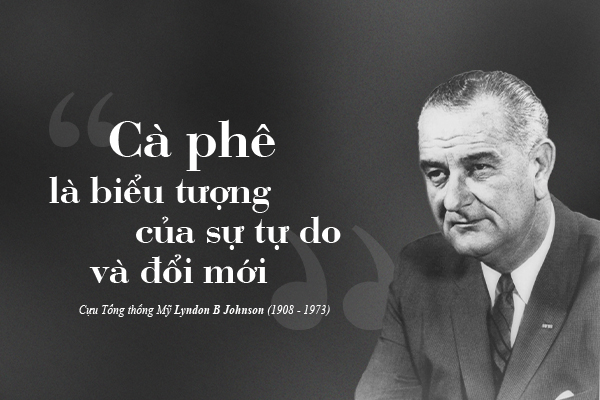
Coffee is a symbol of freedom and innovation. – Former U.S. President Lyndon B. Johnson (1908 – 1973)
Revolutionizing the Creative Style and Piano Performance
Romanticism in music lasted from the early 19th century to the early 20th century, and was characterized by highly complex, personal music that emphasized the expression of emotion. During this period, Frédéric Chopin (1810-1849) was one of the most representative composers, being the first to explore the depths and complexities of emotion through his piano works. Chopin’s compositional and piano performance style broke through traditional keyboard playing, differing from the lyrical character and unique harmonic approach, emphasizing single notes and featuring large fluctuations in tempo. Chopin’s creativity contributed to elevating early Romantic music to its height and helped the piano become the most widespread instrument of the 19th century.
Frédéric Chopin was born in Warsaw (Poland) and was exposed to the piano from a young age, beginning professional training at the age of 6. He quickly displayed extraordinary musical talent and was compared to the musical prodigy Wolfgang Amadeus Mozart (1756-1791). His first composition, written at the age of 7, was a Polonaise, one of the familiar Polish folk dances.
In the following years, Frédéric Chopin focused on studying, creating, and performing music. Unlike most composers of his time, Chopin primarily wrote solo piano compositions rather than symphonies or operas. Despite his young age, with tireless effort and masterful piano composition techniques, Chopin established himself with groundbreaking works, including variations on a theme from the opera Don Giovanni, the Nocturne in E minor, Op. 72 No. 1, and the Polonaise in D minor, Op. 71 No. 1.
In particular, as a lover of creativity and experimentation, Frédéric Chopin’s music continuously broke away from previous musical composition conventions and added new forms to the world’s classical music repertoire. He created the new musical genre of the Ballade and reimagined certain genres like Nocturnes, Scherzos, Études, and Preludes to produce novel musical effects. Prior to Chopin, the Étude genre was primarily composed as technical exercises for pianists, but through his revisions, the Étude became a true musical work of art.
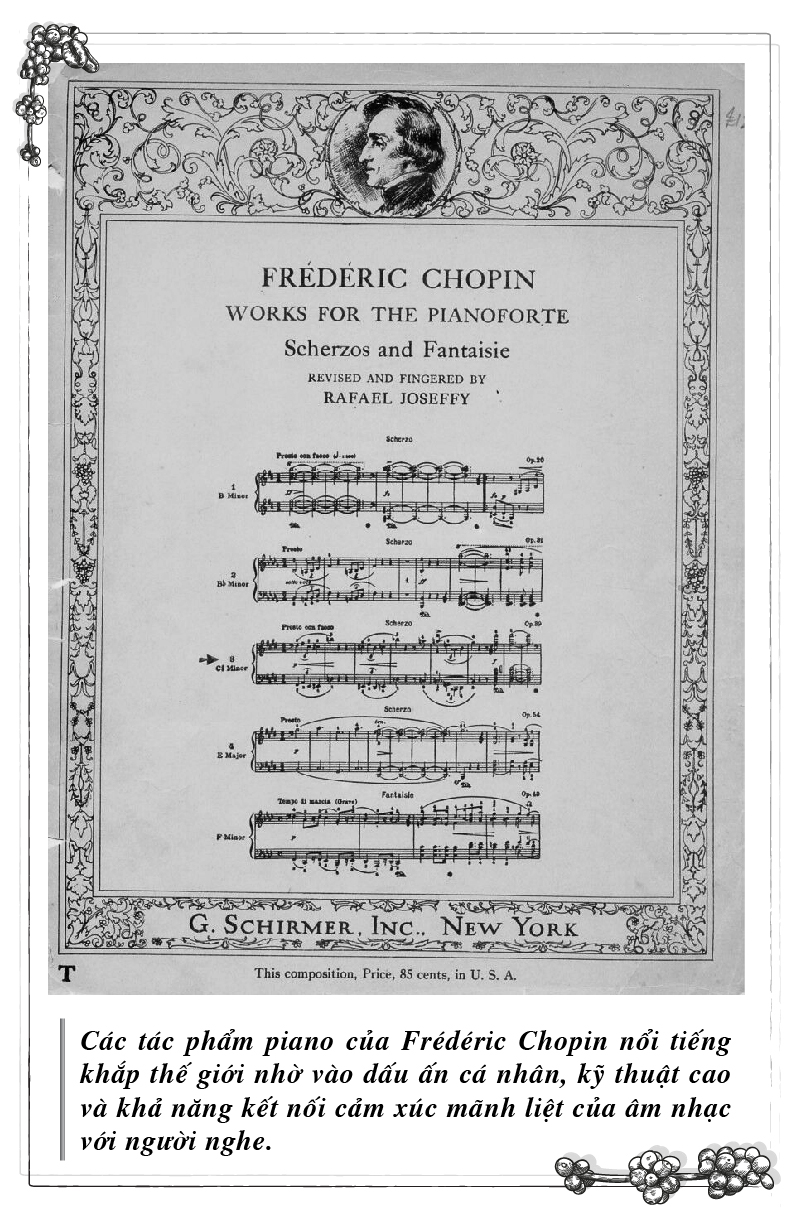
Frédéric Chopin’s piano works are renowned worldwide for their distinct personal style, technical mastery, and ability to evoke powerful emotional connections with the listener.
Beyond his compositional prowess, Frédéric Chopin also possessed exceptional performance technique. Overcoming the inherent limitations of the piano’s monophonic sound, through his virtuosic technique, Chopin was able to express a wide range of emotional layers, where each note seemed to be imbued with energy and the ability to evoke narratives encompassing states from divine bliss to existential turmoil…
Additionally, Frédéric Chopin frequently experimented with improvising new rhythms and structures during his concert performances. Through these explorations, he discovered novel musical ideas and diverse piano playing techniques. Chopin’s innovations in finger positioning, pedal usage, and overall keyboard manipulation elevated his music beyond the traditional piano style, establishing a significant milestone in the history of the piano. Moreover, his compositions have become the benchmark for this instrument.
The timeless creativity of Frédéric Chopin in terms of musical style, form, and harmony had a profound influence on composers during and after the Romantic era, including Franz Liszt (1811–1886), Claude Debussy (1862–1918), Gabriel Fauré (1845–1924), and Richard Strauss (1864–1949). To this day, Chopin’s music continues to be widely performed and utilized in professional music education and training across the globe.
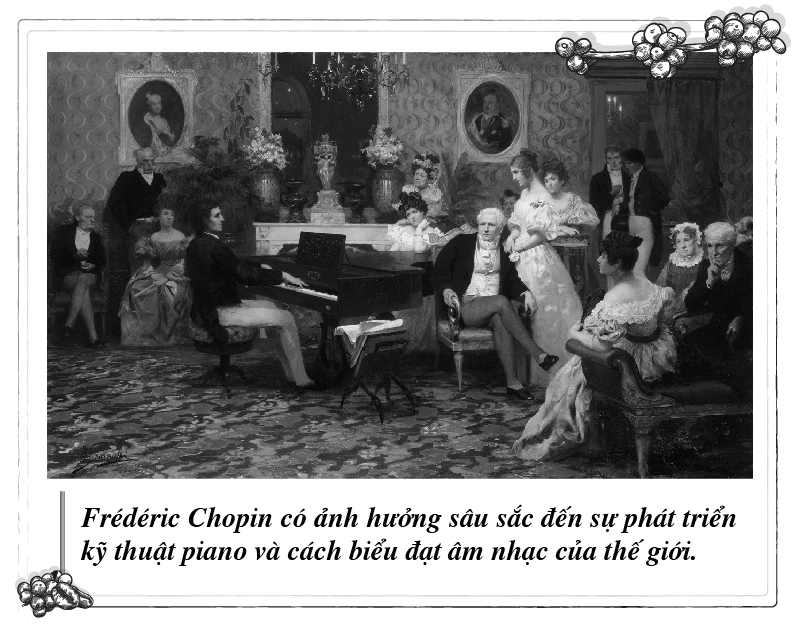
Frédéric Chopin had a profound influence on the development of piano technique and the expressive capabilities of music worldwide.
Embodiment of Nationalism in Music
The Romantic era of music was marked by a strong trend towards music with a nationalist spirit. Composers strived to convey the resonance of their homeland, national traditions, and themes of national liberation. As one of the first composers to integrate elements of Polish folk music into piano works, Frédéric Chopin transformed traditional Polish folk melodies into some of the most iconic examples of musical nationalism.
During his time as a student at the Warsaw Conservatory, Frédéric Chopin and his friends would participate in holidays and performances across Poland. Through these travels, he was able to directly experience the folk music of the Polish lowlands, igniting a profound passion within him. Chopin became determined to delve deeper into the study and exploration of Polish folk music and traditions than any composer before him.
In particular, Polish cafes were a familiar destination for Frédéric Chopin during his research into Polish folk music and traditions. He would frequently visit cafes in the Miodowa, Kozia, and Krakowskie Przedmiescie areas to meet with friends who shared his passions, discuss the country’s culture and traditions, and stay up to date on the latest news, critiques, and developments in music and theatre.
As vibrant reflections of Polish social life, and as centers for discussing cultural, political, and artistic issues, cafes such as Honoratka, Pani Brzezińska, Pod Kopciuszkiem, Dziurka, and Wiejska Kawa became Frédéric Chopin’s favorite spaces. It was in these cafes that conversations, observations, and knowledge exchanges took place, allowing Chopin to amass a wealth of insights into the culture and traditions of his homeland of Poland – insights that would go on to shape the course of his musical career.
By incorporating the harmonies and Polish folk dances such as the Mazurka, Kujawiak, Polonaise, and Oberek into his piano works, Frédéric Chopin developed a distinctive musical style. From this synthesis, traditional Polish folk music genres became widely disseminated in concert halls and left their mark on the musical landscape of Europe.
Concurrently, Frédéric Chopin developed a fondness for oak-smoked coffee, a traditional Polish beverage. Brewed with spices, cloves, and honey, this oak-smoked coffee was considered a special source of energy that stimulated Chopin’s creative spirit, dynamism, and awakening – qualities that allowed him to become a great composer, as well as to persevere through the debilitating illness that plagued him in his final years.
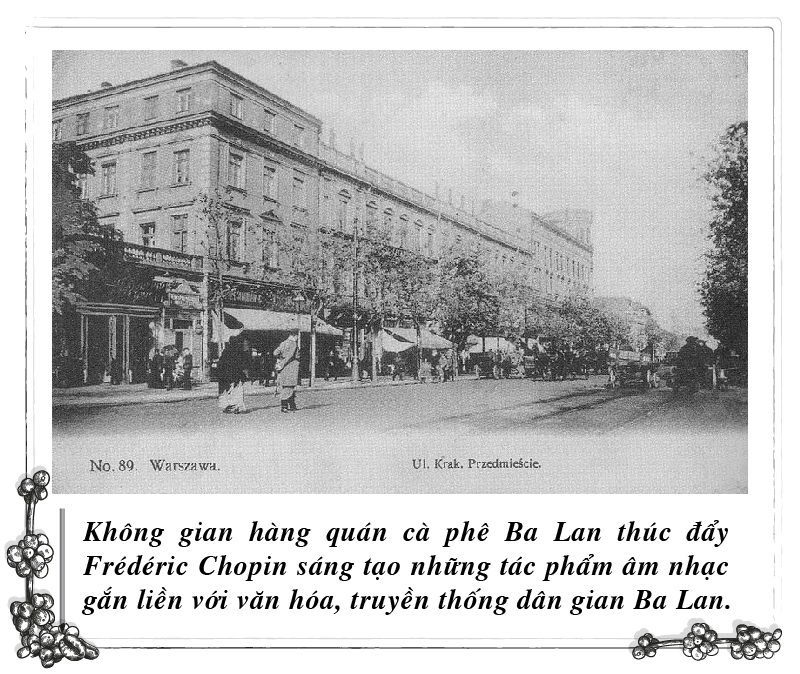
The Polish cafe environment inspired Frédéric Chopin to create musical works that were deeply intertwined with Polish folk culture and traditions.
Influenced by the political events of 1831, Frédéric Chopin, along with much of the Polish elite, emigrated to France. Living in exile only deepened Chopin’s emotional connection to his homeland and fueled his drive to honor and preserve the cultural heritage of his country through his music.
Constantly preoccupied with his homeland, Frédéric Chopin utilized Polish folk music elements combined with his virtuosic piano technique to compose works that expressed the national will, spirit, and multifaceted emotions of the Polish people – from the tragic suffering of oppression to the heroic drive for freedom. Exemplary works in this regard include the Fantasy on Polish Airs and the Revolutionary Étude.
Chopin’s profound emotional expression and strong sense of nationalism helped his compositions become symbols of Polish national identity and pride, cementing his status as a leading representative of musical nationalism in world history. Chopin’s nationalist spirit was so potent that during World War II, the Nazi German regime banned the performance of his Polonaises in Poland, fearing the nationalist symbolism contained within his works.
During his time living in France, Frédéric Chopin maintained a deep affection for traditional Polish cuisine, especially oak-smoked coffee. He also frequently participated in social gatherings with friends and prominent figures, dining, conversing, and exchanging music at cafes such as Cafe de Foy and Cafe Tortoni.
Chopin’s open personality and his superb musicianship helped him find numerous opportunities to showcase his talents and gain renown in France. He also received acclaim from prominent Parisian artistic figures such as the composers Robert Schumann (1810-1856), Giacomo Meyerbeer (1791-1864), and Hector Berlioz (1803-1869). Throughout the 20th and 21st centuries, Frédéric Chopin’s works have remained beloved and have been the subject of many films, books, art, and biographies, explored from diverse historical perspectives.
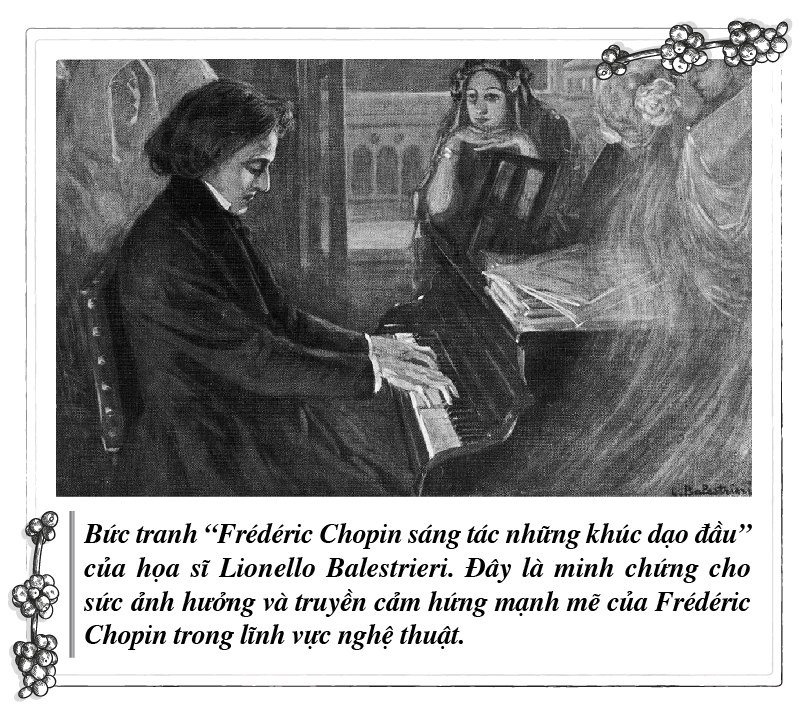
The painting “Frederick Chopin Composing the Preludes” by the artist Lionello Balestrieri is evidence of the profound influence and inspirational power of Frédéric Chopin in the realm of art.
Despite his short lifespan, Frédéric Chopin made immense contributions to the history of world music, from being a master of profound emotional expression, to innovating musical genres, revolutionizing piano technique, and becoming a national folk icon and source of pride for the Polish people. Particularly, in Chopin’s extraordinary creative process, coffee and cafes played a role in stimulating his creative thinking and shaping his unique musical style, which ultimately elevated Romantic-era music to its pinnacle and established enduring musical standards..
Readers are cordially invited to watch the series of The Tao of Coffee videos posted on https://bit.ly/caphetrietdao
Coming up: Coffee and the formation of specialized terminology


